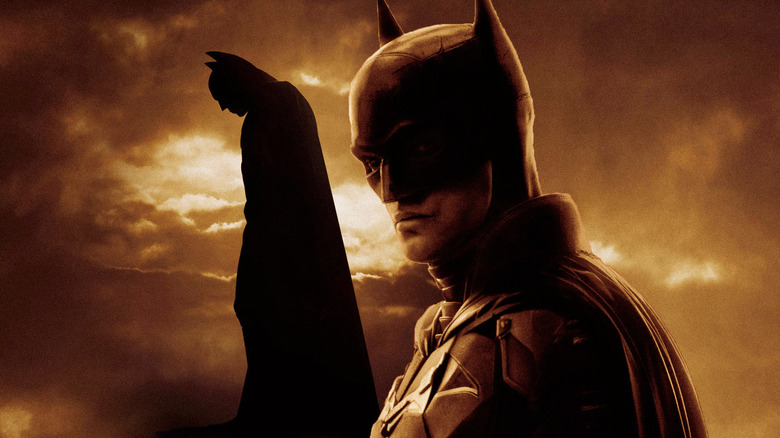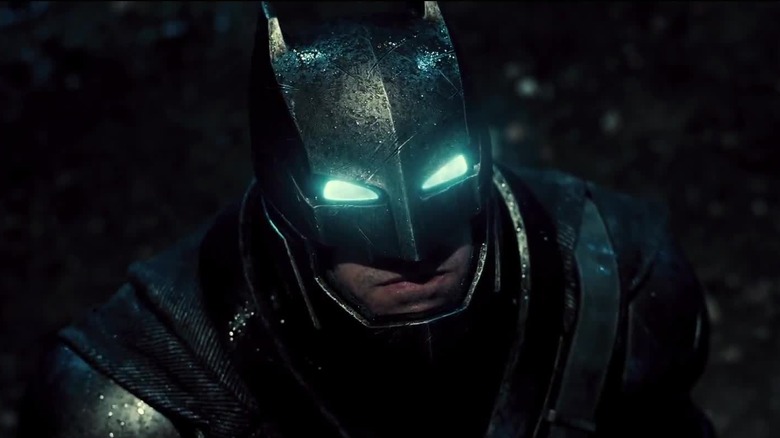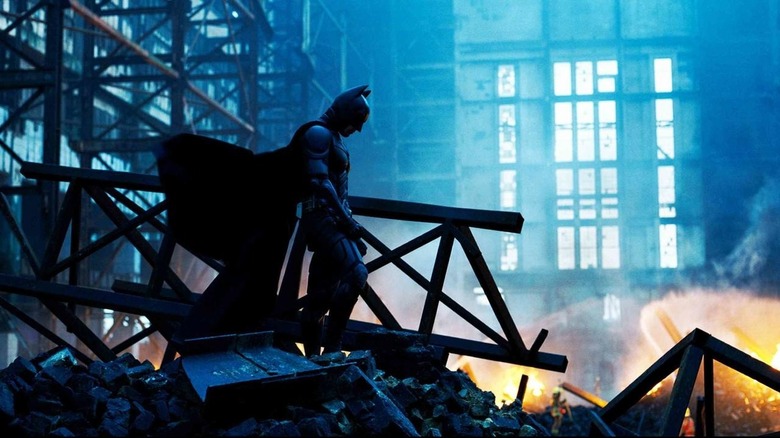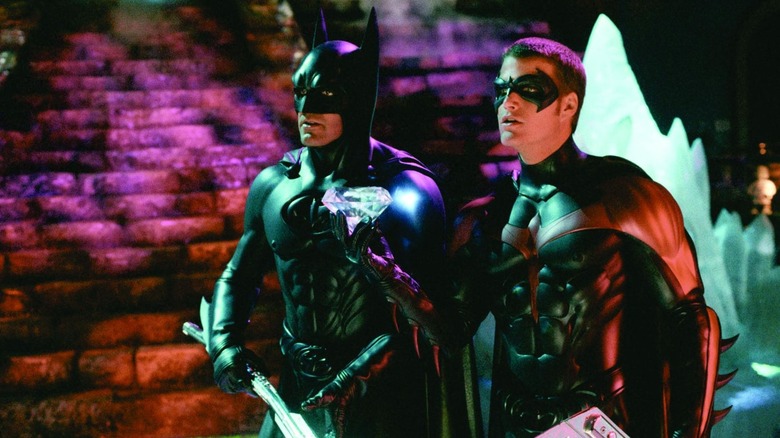Tales From The Box Office: The Enduring Star Power Of Batman
(Welcome to Tales from the Box Office, our column that examines box office miracles, disasters, and everything in between, as well as what we can learn from them.)
There are few characters that have enjoyed the same enduring legacy in the pop culture landscape that Batman has. Sure, much of that currently can be chalked up to the superhero movie boom that has been going on for the past couple of decades, but that doesn't account for the nearly 60 years of success that Bob Kane and Bill Finger's legendary creation had prior to the 2000s. Dating back to Tim Burton's 1989 "Batman," the character has been a towering figure in cinema as well as the small screen. And, despite some speed bumps, the Caped Crusader's staying power is downright remarkable.
Now, the world has a brand new Dark Knight in the form of Robert Pattinson, who stars in "The Batman," out in theaters this weekend. Directed by Matt Reeves, this latest vision of Gotham City is dark and grounded, with Pattinson's particularly emo superhero at the center of it all. In honor of the movie's release, we're going to look back at Batman's long history on screen, how well each of the movies has performed commercially, and what lessons Hollywood might be able to extract from the big picture.
The movies: Batman (various)
Batman initially debuted in the pages of "Detective Comics" back in 1939 and it didn't take too long for a live-action version of the character to appear, with Lewis Wilson portraying the character in a live-action serial released in 1943 at the height of World War II. Ever since, DC's beloved superhero has had a place within the greater pop culture framework. Things got a big boost in the 1960s when Adam West brought the hero to life in the "Batman" TV show, which was then given the big-screen treatment in 1966 with "Batman: The Movie." While this delightfully campy take on Batman would go by the wayside in the decades to come in favor of a dark and brooding Batman largely derived from Frank Miller's reinvention of the character in "The Dark Knight Returns," West helped bring him to the masses in a new way.
But the true turning point for the Caped Crusader on screen would come in 1989 from Warner Bros. with the release of "Batman," which starred Michael Keaton as Bruce Wayne alongside Jack Nicholson's Joker in one of the defining blockbusters of cinema history. "Batman" was a gargantuan box office hit that spawned ridiculous amounts of tie-in products and generated millions upon millions of dollars well beyond ticket sales. This was, in many ways, the first modern blockbuster. Ever since, Warner Bros. has leaned on the "Batman" franchise with dizzying highs and baffling lows along the way.
Following the surprisingly dark "Batman Returns," it was Joel Schumacher's turn to bring a bright, neon-soaked vision of Gotham City to life in "Batman Forever," which saw Vil Kilmer taking over as the title character. That was followed by George Clooney's Bat-nipples in the much-maligned "Batman & Robin," which curbed the franchise for nearly a decade before Christopher Nolan would reinvent it entirely in 2005's "Batman Begins," with Christian Bale now stepping up to play the part. That movie's greatest gift was doing well enough to earn a sequel, which took the form of "The Dark Knight" – yet another defining blockbuster for the ages that remains one of the shining examples of what a superhero movie can be beyond the ordinary, ascending to extraordinary heights.
Then came Zack Snyder's complicated vision of the character played by Ben Affleck in "Batman v Superman: Dawn of Justice." Old, grizzled, and ready to kill, this was the new Batman of the DCEU, and one that proved to be so divisive that Warner Bros. has kind of been trying to pick up the pieces ever since. In many ways, we don't get to "The Batman" and Pattinson's early-in-his-career, grounded version without the complications that came with Batfleck (by no fault of Affleck's, we should add).
All of this to say, the "Batman" franchise has offered much over its run and, not surprisingly, the numbers tell an interesting tale. Sometimes stunningly great, sometimes eyebrow-raisingly bad. All fascinating.
The financial journeys
Rather than do a full breakdown for each movie individually as I typically do in this column, we're going to look at three key numbers for each theatrically released "Batman" movie: its reported budget, its global box office (per The Numbers), and what I'll call the budget multiplier, which is essentially how many times over it made its budget back in raw ticket sales.
It should be noted I am not counting spin-offs such as "Joker," nor am I counting "Justice League" as Batman was only part of the equation, but not sold within the title. I am, however, including animated movies that were given exclusive theatrical runs (but not movies like "Batman: The Killing Joke," which was made for Blu-ray but got a limited engagement, for example). Also, Adam West's "Batman: The Movie" has very little by way of actual box office figures available, so I am also leaving that one off the list simply because there isn't enough reliable data to do it justice.
Caveats in place, here's how the Batman movies stack up in terms of production budget vs. worldwide gross.
- "Batman" - $35 million budget, $411 million box office, 11.7x its budget.
- "The Dark Knight" – $185 million budget, $1 billion box office, 5.49x its budget.
- "The Dark Knight Rises" – $230 million budget, $1.08 billion box office, 4.38x its budget.
- "The LEGO Batman Movie" – $80 million budget, $310 million box office, $3.8x its budget.
- "Batman Forever" – $100 million budget, $336 million box office, 3.36x its budget.
- "Batman v Superman: Dawn of Justice" – $263 million budget, $872 million box office, 3.31x its budget
- "Batman Returns" – $80 million budget, $266 million box office, 3.3x its budget.
- "Batman Begins" – $150 million budget, $358 million box office, 2.3x its budget.
- "Batman & Robin" – $125 million budget, $238 million box office, 1.9x its budget.
- "Batman: Mask of the Phantasm" – $6 million budget, $5.6 million box office, .9x its budget.
The lessons contained within
It would be unfair to every other studio trying to make a go of it in modern Hollywood to say "just go find yourself a character to buy the rights to like Batman!" Frankly, there are maybe only a couple of those in existence with Spider-Man being the other one, and Spidey is locked up good and tight at Sony. This is a specific game only a few people get to play, and it's typically a mistake to try and make other characters feel as important to the general public because they simply won't be. There is a magic to Batman that can't be conjured up by another brooding hero simply because other superheroes are popular (Vin Diesel's "Bloodshot" probably didn't fail just because of the pandemic). Find another way. There are no other Batmans out there.
Now, as for any practical lessons that might be extracted from the raw data? Overall, it's hard to argue with the broad results. About $6 billion in box office against $1.5 billion in combined production budgets is outstanding, and that doesn't even account for all of the merchandise and ancillary value that has been created over the decades as a result of these movies. We're talking additional billions here. Warner Bros., overall, has done well in cashing in on this titan of pop culture.
But what about the misfires? Is there a pattern here? Can something be learned by looking at the complete picture?
Let's be real: 1989's "Batman" is a singular return on investment the likes of which expensive blockbusters will rarely ever touch again. The fact that a movie that big was able to generate so much from a relatively tiny budget is miraculous. As the data shows us, no "Batman" movie since has been nearly that cheap, and with good reason. In truth, the only out-and-out misfire of the whole bunch is "Batman & Robin," which was sort of doubling down on the lesser elements of "Forever" while switching actors once again and putting even more money into it. It's a classic example of letting the whole thing get too big for its britches. Even "Batman: Mask of the Phantasm" found a long life well beyond theaters.
Perhaps the big lesson here for anyone else that has a big character or some other major piece of IP to play with is that different takes on that franchise are valid and welcome. "Batman" and "The Dark Knight" couldn't be more different and yet, they both made a f***-ton of money and earned their place in history. "The LEGO Batman Movie" is a downright love letter to Batman and the world he inhabits, and it was rewarded for its troubles. Even "Batman v Superman," for all of the headaches it caused, earned a lot in raw dollars and generated a take on the character that a lot of people absolutely love. Now, would it have helped if that movie didn't cost nearly $300 million? You bet, but the point still stands that Warner Bros. has welcomed a lot of different takes on this character over the years and has more often than not been rewarded for doing so.
Let "Spider-Man" be different things. Give us a Miles Morales movie to showcase something new yet familiar. Let "Star Wars" be more than characters we know and the same four planets we've seen before. Allow the "Transformers" to graduate from Bayhem and do something different with the robots in disguise. Hell, maybe let Jason Voorhees go play in the snow once the "Friday the 13th" film rights get sorted out. Let your characters and franchises that will outlive us all be more than just a limited point of view or take on that world. It benefits the viewer and, in many cases, the ones hoping to cash in.



